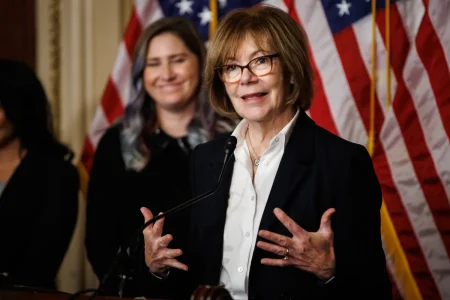Trump’s Reversal on Epstein Files: A Shift in Political Strategy
In a surprising turn of events, President Donald Trump has publicly called for House Republicans to vote in favor of releasing the Jeffrey Epstein case files. This abrupt reversal, announced via a Truth Social post late Sunday, marks a significant shift from the Trump administration’s months-long resistance to the release of these documents. “House Republicans should vote to release the Epstein files, because we have nothing to hide,” Trump declared, framing the issue as a “Democrat Hoax perpetrated by Radical Left Lunatics” designed to distract from Republican successes, including what he termed a “Victory on the Democrat ‘Shutdown.'”
The timing of Trump’s reversal is particularly noteworthy, coming amid growing bipartisan support for the Epstein Files Transparency Act. Representatives Thomas Massie and Ro Khanna, the bill’s co-sponsors, estimated that dozens of Republicans would vote for the legislation, with Massie suggesting there could be “100 or more” Republican votes, potentially enough for a “veto-proof majority.” This groundswell of support may have forced Trump’s hand, leading him to align himself with what now appears to be the inevitable direction of his party. The president’s shift also occurs against the backdrop of emerging rifts with some of his congressional supporters, including Representative Marjorie Taylor Greene of Georgia, who had previously been one of his staunchest allies.
While Trump now encourages transparency, questions linger about his motivations and timing. New information has recently emerged regarding Epstein’s connections to Trump, including a 2019 email in which Epstein wrote to a journalist claiming Trump “knew about the girls.” Trump has consistently denied any knowledge of Epstein’s criminal activities and has stated that he severed their relationship years before Epstein’s death. It’s important to note that Trump has never been accused of wrongdoing in connection with Epstein, and the appearance of an individual’s name in the investigation files does not imply culpability. Representative Massie himself stated, “I’ve never said that these files will implicate Donald Trump. I really don’t think that they will,” suggesting instead that Trump might be “trying to protect a bunch of rich and powerful friends, billionaires, donors to his campaign, friends in his social circles.”
The political maneuvering around this issue has sparked varied reactions across the political spectrum. Democrats like Representative Robert Garcia welcomed Trump’s reversal but pointed out that as president, Trump could authorize the release of the files without congressional action, urging him to “Stop the cover-up, RELEASE THE FILES!” Democratic strategist Mike Nellis characterized Trump’s shift as a reaction to the inevitable, saying Trump was “forced into this position” to avoid “a full-blown rebuke from his own party.” Conservative Trump critic Bill Kristol raised concerns about whether some files might have already been destroyed. Meanwhile, House Speaker Mike Johnson defended Trump, stating, “Trump has clean hands. He’s not worried about it… He has nothing to do with this. He’s frustrated that they’re turning it into a political issue.”
Trump’s social media statement attempted to reframe the narrative, claiming, “Nobody cared about Jeffrey Epstein when he was alive and, if the Democrats had anything, they would have released it before our Landslide Election Victory.” He portrayed some Republicans as being “used” and urged the party to focus instead on “Record Setting Achievements” rather than fall into what he termed the Epstein “TRAP,” which he characterized as “actually a curse on the Democrats, not us.” This rhetorical shift attempts to transform what had been a defensive position into an offensive one, suggesting the issue will ultimately harm Democrats rather than Republicans.
Despite Trump’s newfound support for releasing the files, the bill’s future remains uncertain. Even if it passes the House with substantial Republican backing, it must still clear the Senate and ultimately receive the president’s signature to become law. If enacted, the legislation would compel the Justice Department to release all files and communications related to Epstein, as well as information about the investigation into his 2019 death in federal prison while awaiting trial on sex trafficking charges. The bill would permit redactions of information about Epstein’s victims or ongoing federal investigations. As this political drama unfolds, it highlights the complex intersection of power, accountability, and political calculation in Washington, with both parties maneuvering to control the narrative around a deeply troubling case that continues to cast shadows years after Epstein’s death.















